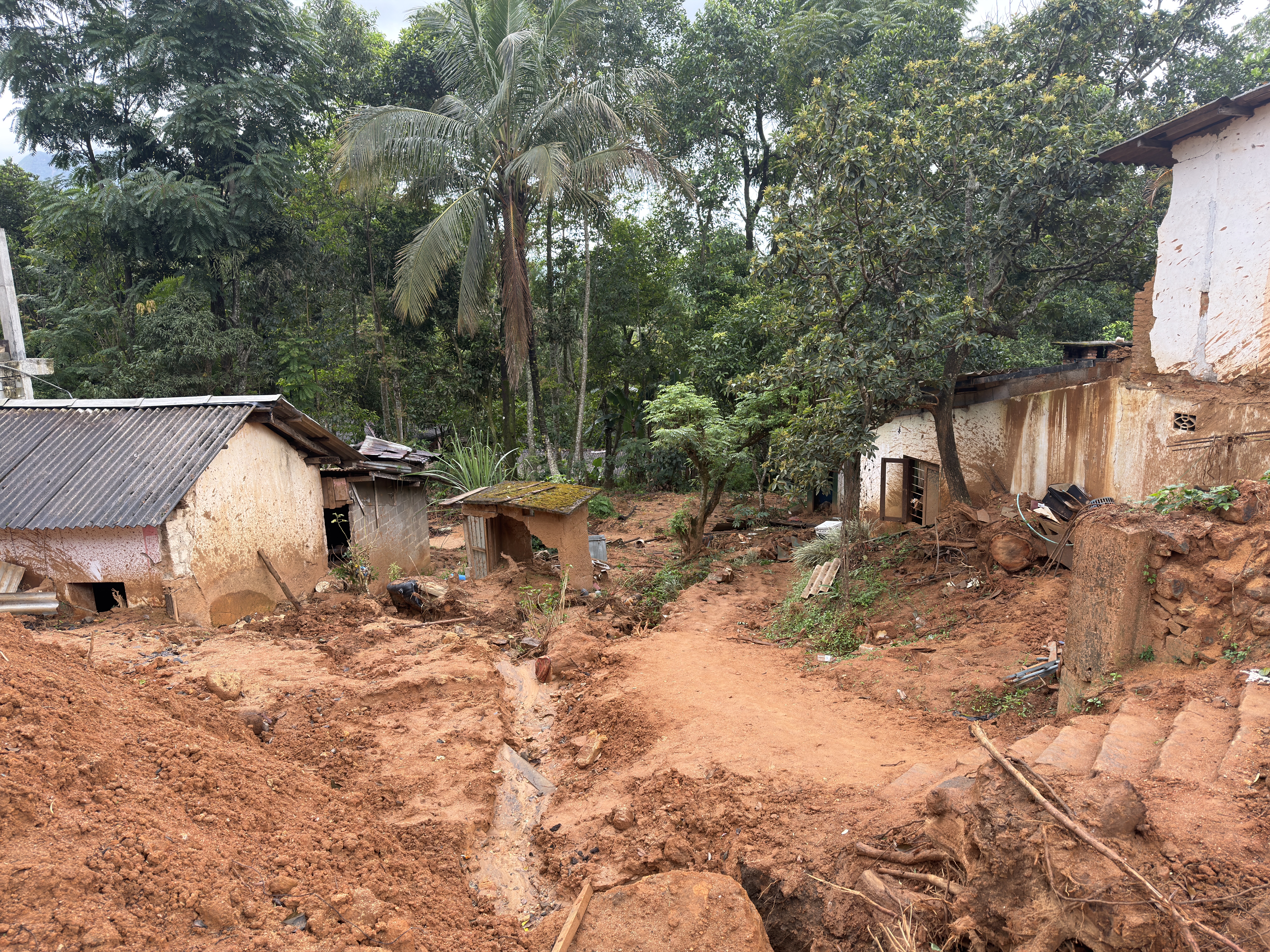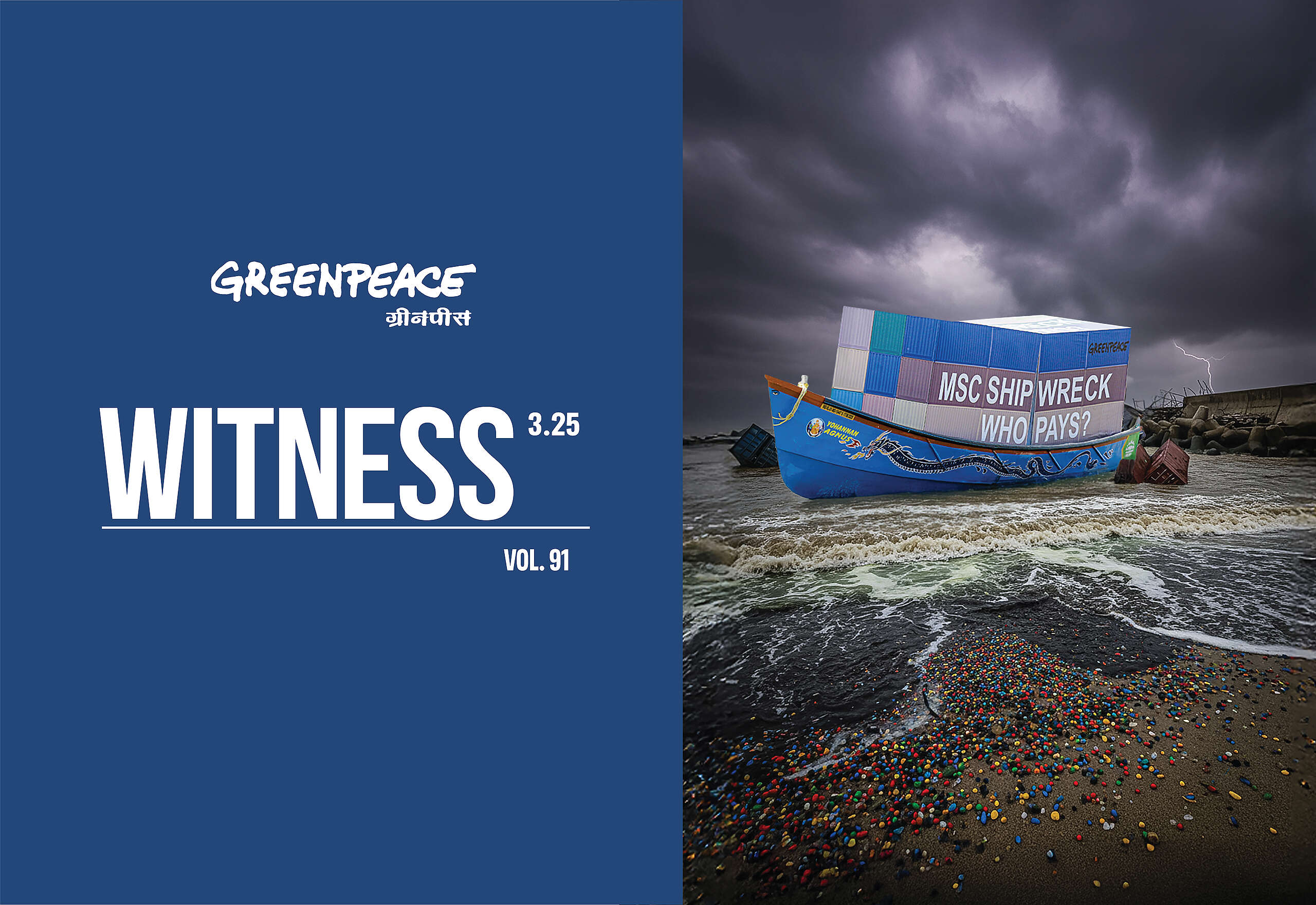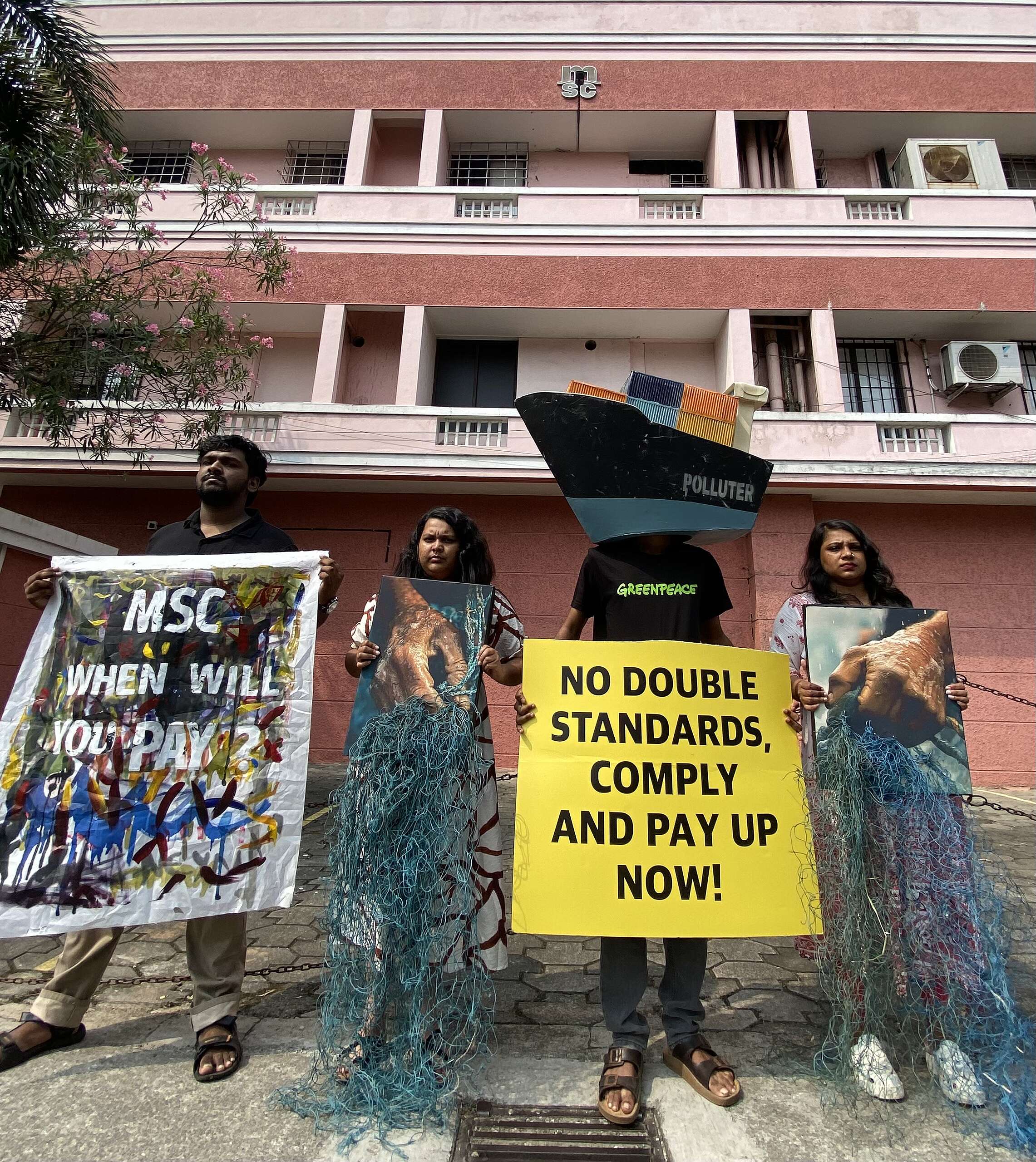On 25 May 2025, just weeks before World Oceans Day and four years after Sri Lanka’s X-Press Pearl disaster, the MSC ELSA 3 ship sank off Kerala’s coast.
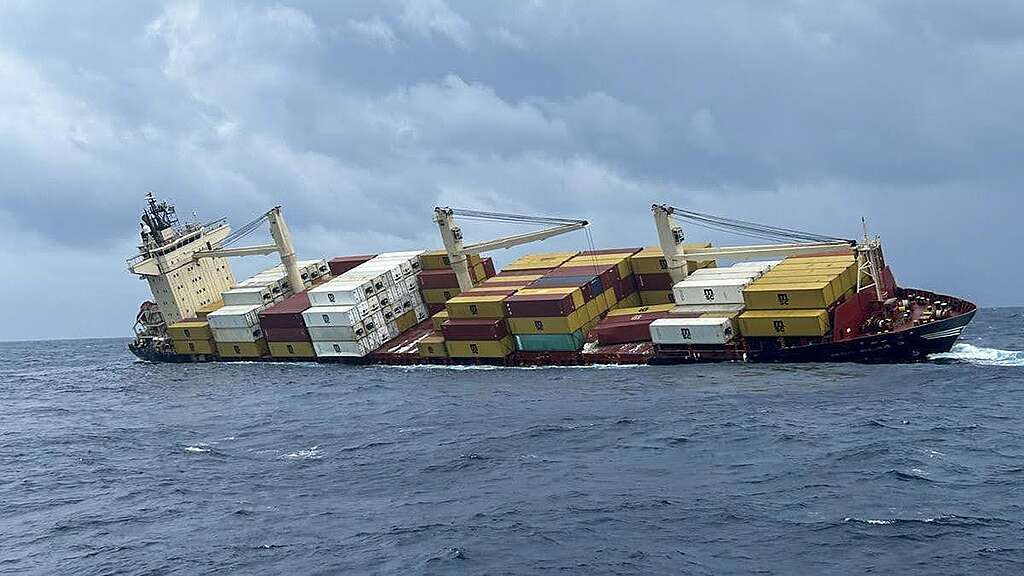
It carried 643 containers — 13 with hazardous chemicals, 12 with calcium carbide, and 60 filled with billions of plastic nurdles. Its fuel tanks held 84 metric tonnes of diesel and 367 metric tonnes of furnace oil. When the ship capsized, the monsoon spread oil slicks and nurdles across the shores of Kerala, Tamil Nadu, and Sri Lanka.
For small-scale fishers, the timing was devastating. The monsoon season is when the sea comes alive, breeding grounds flourish, nets are cast, and communities prepare for harvest. Instead, they woke to oil-soaked and torn nets, dead fish, stranded containers, and beaches littered with plastic pellets.
Greenpeace South Asia Response
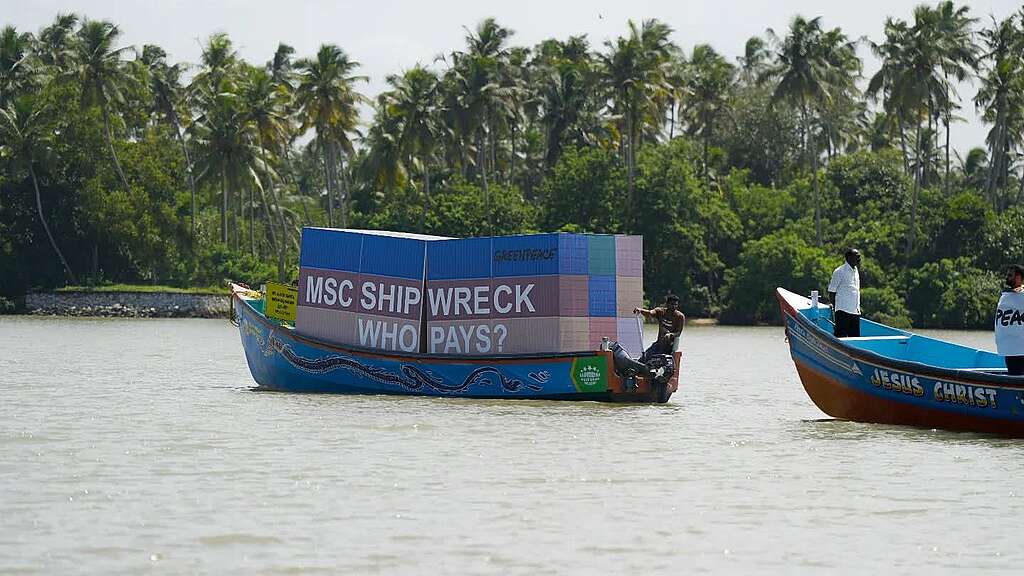
Within days, Greenpeace teams in Kerala joined local allies. We demanded transparency and urgent cleanup from both MSC and the authorities, while documenting oil leaks, stranded containers, and nurdle spills.
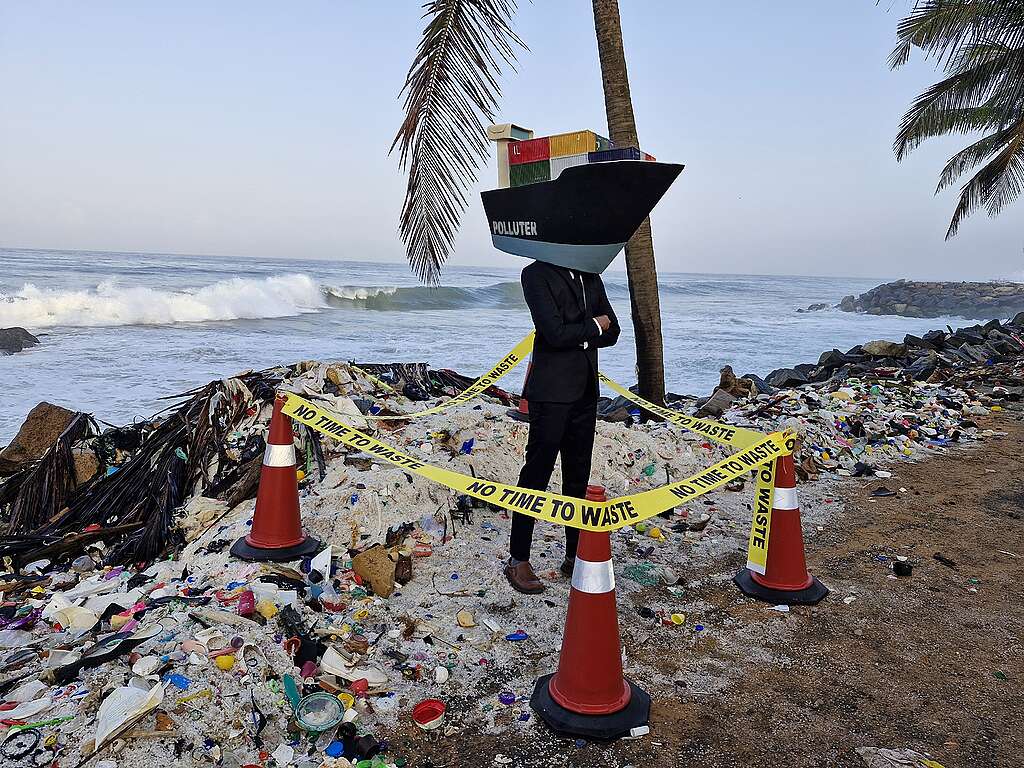
On World Oceans Day (8 June), we created an art display in Valiyathura: a model ship surrounded by nurdles, banners declaring “No Time to Waste.”
“Profitable companies like MSC must shoulder environmental responsibilities,”
— Amruta S N, Greenpeace India campaigner
Scientific Testing & Documentation
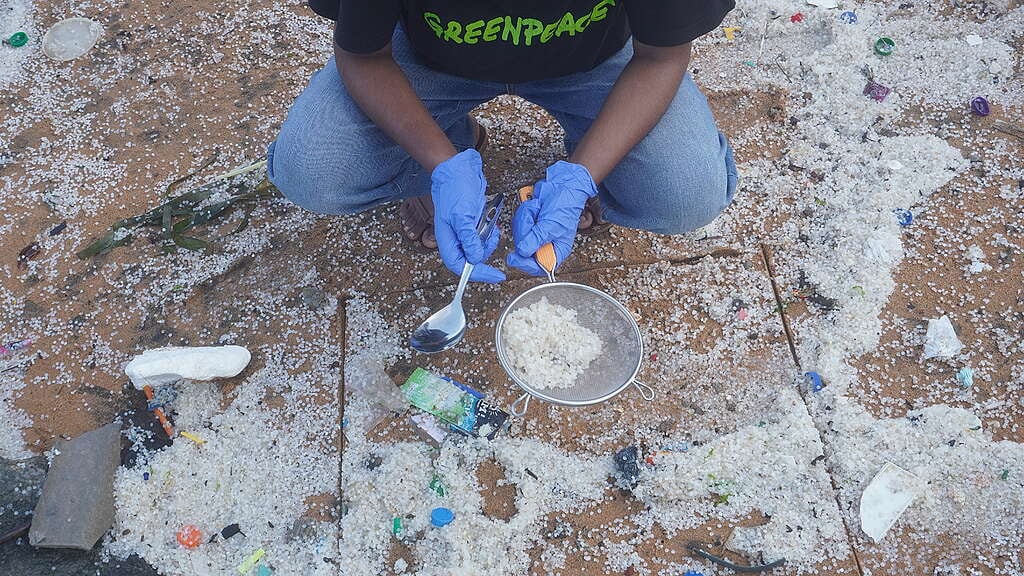
Two rounds of scientific testing began almost immediately.
Marine biologists from Kerala University and Friends of Marine Life collected water and fish samples. Our Greenpeace Science Unit gathered nurdles across beaches from Kollam to Rameshwaram, even as far as Sri Lanka.
Satellite images later confirmed what MSC did not disclose: an unreported oil leak spreading silently into the ocean.
Socio-Economic Report
From 16–26 June, Greenpeace and SPARC surveyed coastal communities in Pulluvilla, Trivandrum.
We noted that in just ten days, 235 households across 13 wards shared stories of lost nets, broken boats, and vanished income.
Community members themselves joined the documentation, learning GPS mapping, photo surveys, and data recording. Their testimonies became the backbone of our socio-economic report, paired with nurdle sampling along India and Sri Lanka’s coastlines.
White Paper, Protests & Compensation Demands
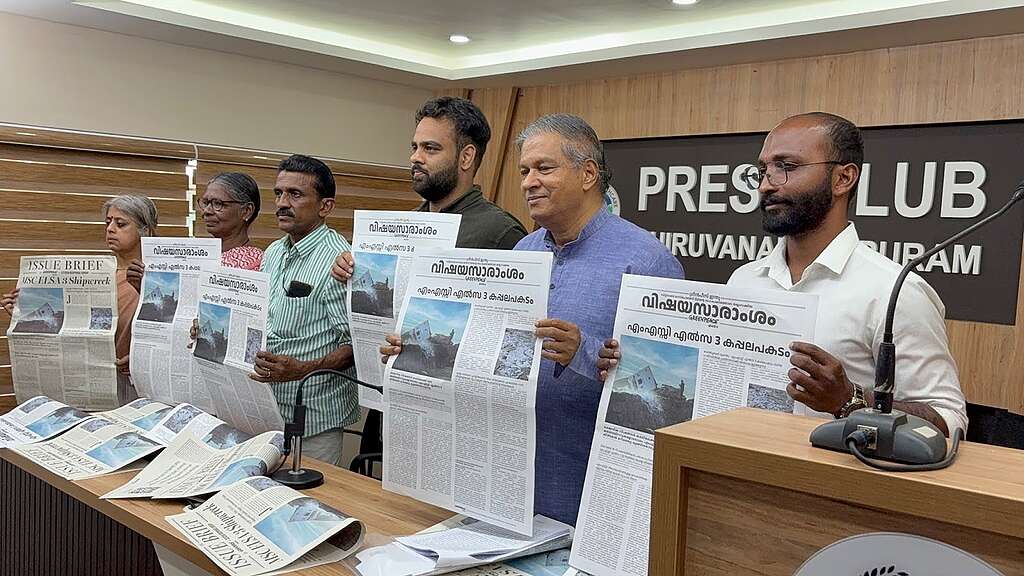
On 28 July 2025, Greenpeace India and allies released The Issue Brief; a White Paper that documented the spread of nurdles and other toxic cargo across South Asia’s coastline.
The impacts we recorded include severe threats to marine biodiversity, including fish stocks and nesting grounds. There was a loss of livelihoods and income for over 1 million coastal people, especially small-scale fisherfolk. We also found several gaps in corporate disclosure, with MSC failing to publish cargo manifests or cleanup plans. Our investigations also found a lack of a government-led monitoring and response mechanism for maritime disasters.
With this evidence in hand, we put forward several demands. We called for independent ecological and health impact assessments, compensation packages for fisherfolk and affected communities, full cargo transparency and public disclosure from MSC, and clear accountability mechanisms to ensure that the polluters bear cleanup costs – not the public.
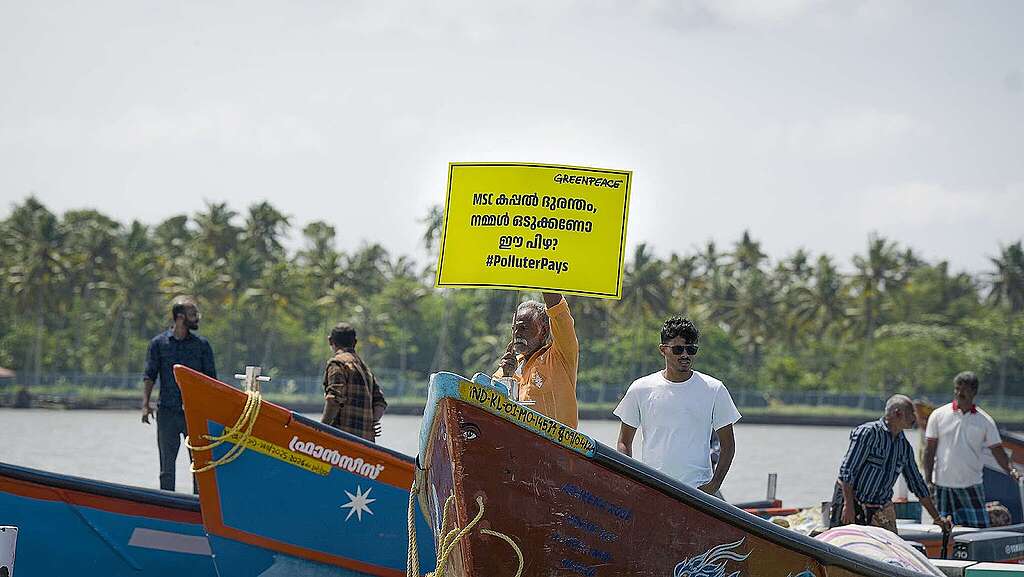
That same week, 20 boats with 80+ fisherfolk staged a floating protest: “MSC Shipwreck: Who Pays?”
The Kerala government called for ₹9,531 crore in damages. MSC denied serious harm. Communities continued to wait.
South Asia Regional Days of Action
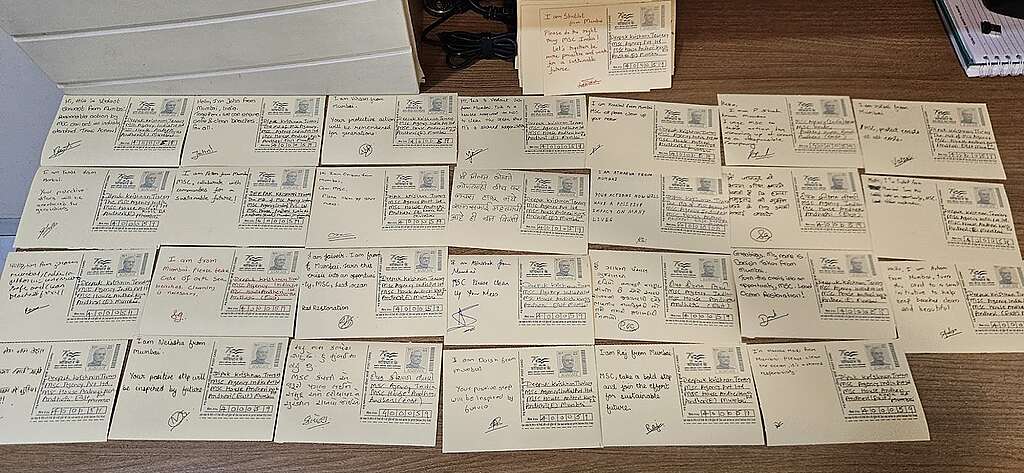
Between August 1–12, Greenpeace and partners mobilised 50 cities across India and Sri Lanka. From Delhi to Galle, postcard drives, street actions, and campus events carried one demand: Who Should Pay? Over 5116 postcards were signed and sent to MSC, amplifying the call for clean-up and compensation. Stencil actions in city streets marked pavements and walls with the message “MSC Pollutes, You Pay”, which served as a bold reminder in public spaces that accountability cannot be brushed away. Visual and street actions by youth groups and artists created striking public moments in metro and coastal cities.
Mumbai Action: Who Pays, MSC?
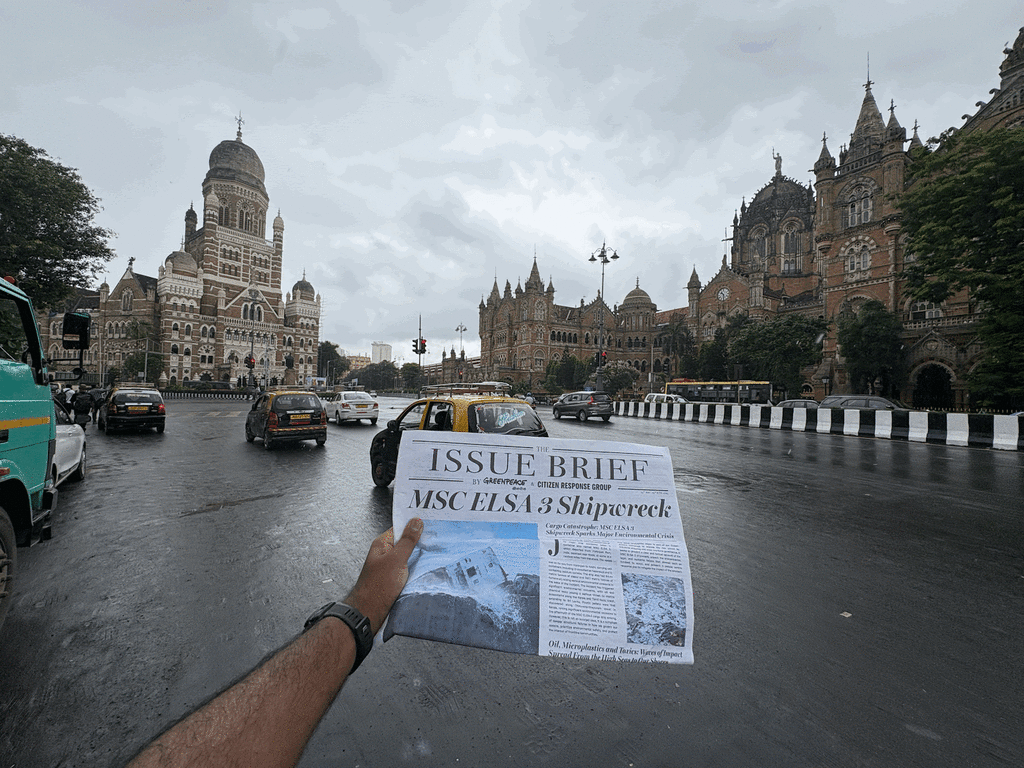
In Mumbai, activists took the fight directly to MSC’s office.
Denied a meeting in spite of multiple attempts, we set up a tea stall outside, handing White Papers to passersby and sparking conversations about the disaster.
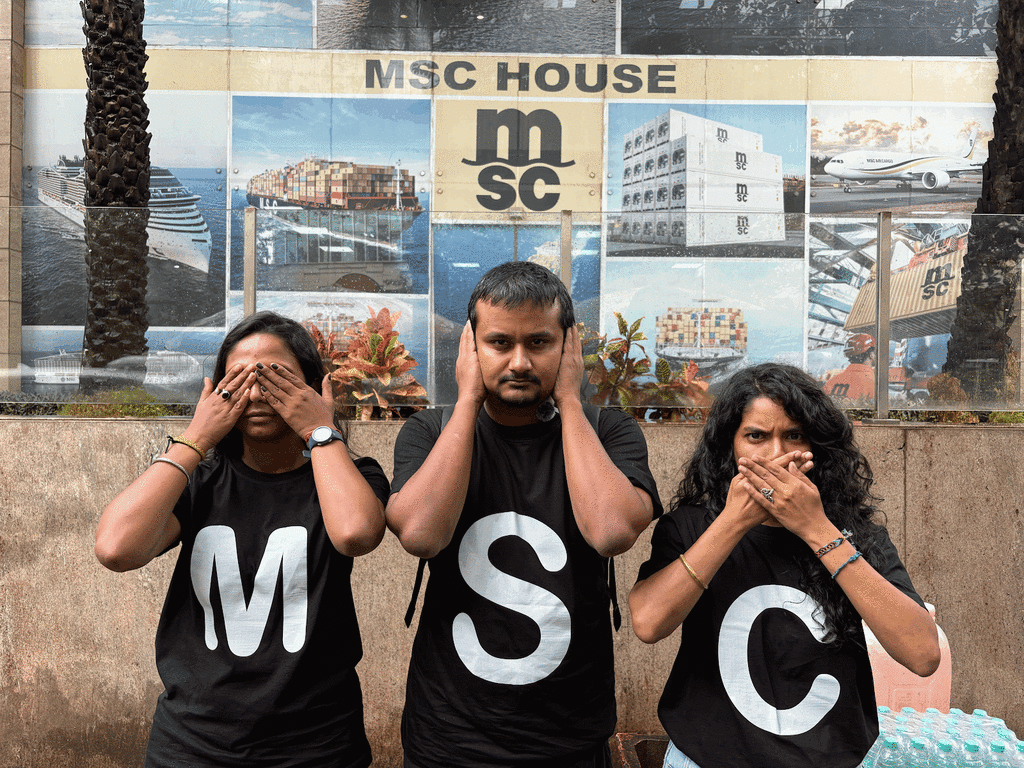
Adding a sharp visual punch, three activists wearing “MSC” T-shirts posed as the “three monkeys”—see no evil, hear no evil, speak no evil—outside MSC’s office and at iconic spots across Mumbai.
The message was unmistakable: MSC cannot turn a blind eye to this disaster.
Citizen-Led Claims Process
With unions, church networks, and panchayats, we started a citizen-led compensation process. Together with these local groups, we gathered testimonies and claims to ensure that public pressure was kept alive until justice is served.
Socio‑economic report launch & public action
When MSC finally published a public notice inviting claims, we responded with Wrecked Futures: The Hidden Socio-Economic Burden of the MSC ELSA 3 Disaster. Released outside the Kerala Government Secretariat in Thiruvananthapuram.
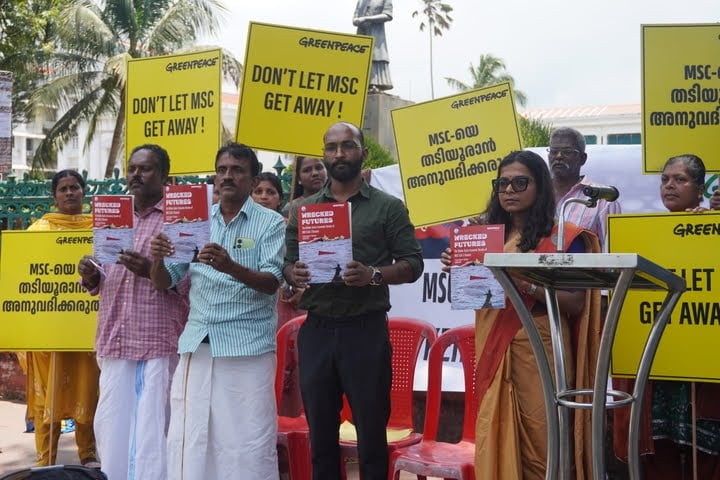
The report uses Pulluvila case studies to show severe economic disruption, social distress and long‑term vulnerability — highlighting the gap between community losses and likely compensation. Speakers included Amruta S N (Greenpeace India), Jackson Pollayil (KSMTF), Rethin Antony (Karimkulam ward member) and community member Denson.
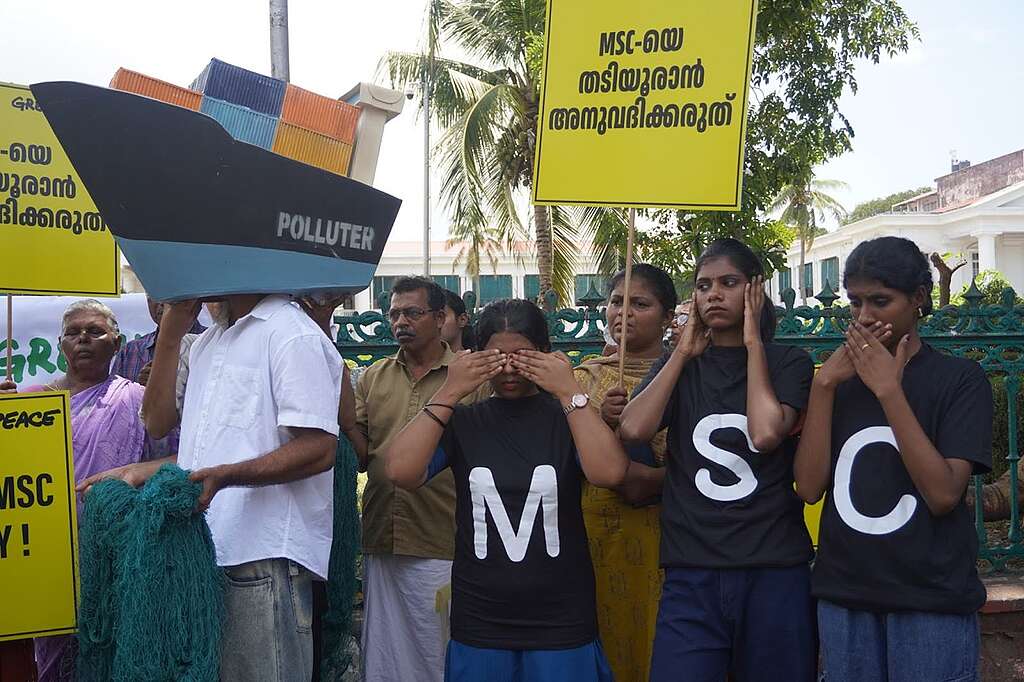
A ship mascot with a broken net stood alongside fisher unions, church leaders, and local representatives. Volunteers in MSC T-shirts once again staged the “three monkeys” act.
The launch reached over 25 media outlets, carrying community voices far beyond the beach.
Kochi photo‑op
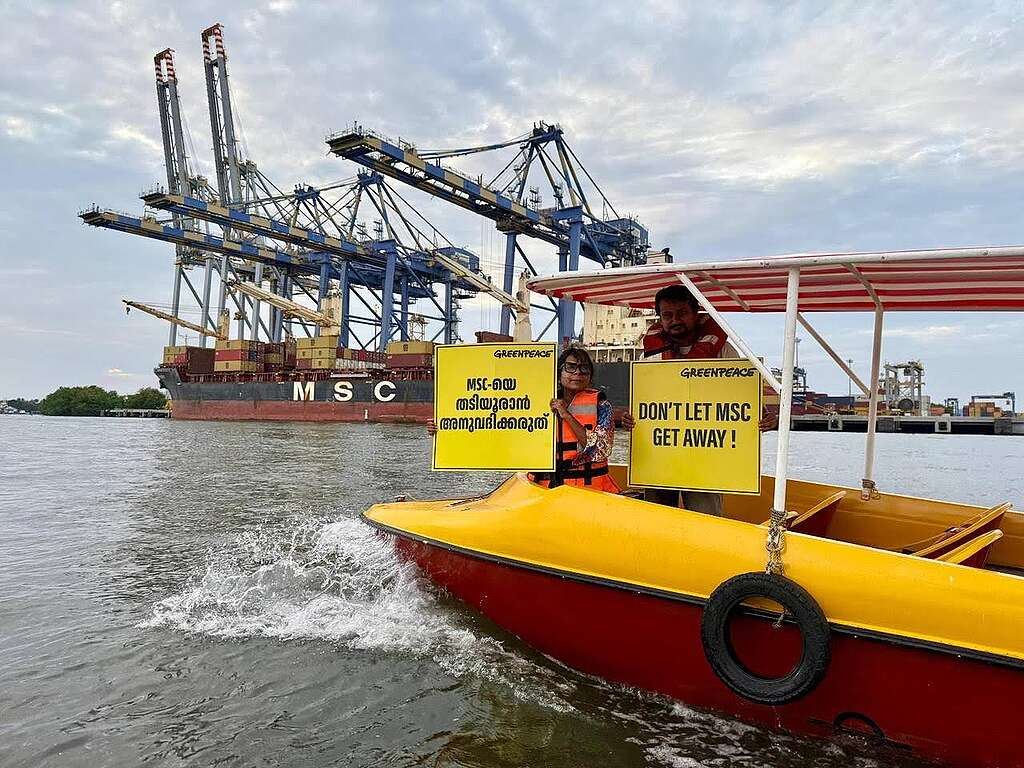
On the 18th in Kochi our team did a quick, spontaneous photo‑op in front of the MSC ship in Kochi, Kerala. We held placards reading “Don’t let MSC get away” and “MSC-യെ തടിയൂരാൻ അനുവദിക്കരുത്”.
Advocacy
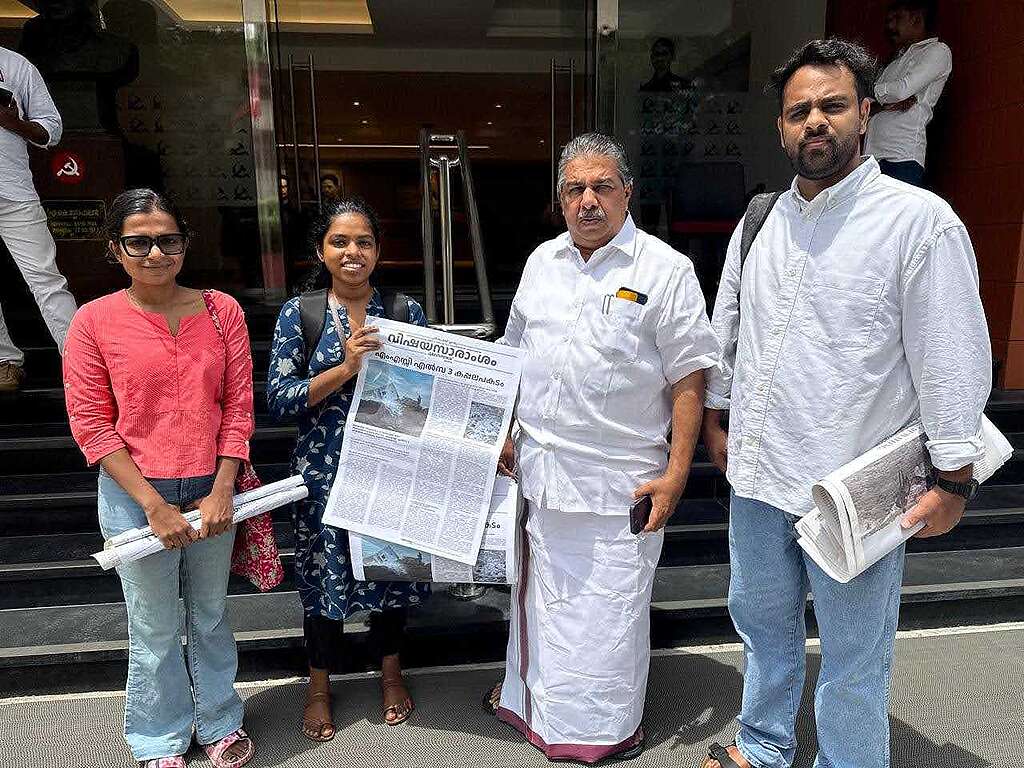
We started our advocacy by handing the White Paper to multiple Kerala ministers and representatives: Saji Cherian (Fisheries), Vasavan (Ports & Shipping), Muhammad Riyas (Tourism & PWD), KN Balagopal (Finance), VK Prashanth (MLA), Shailaja (MLA), and Dr. Thomas Isaac (former Finance Minister). Copies were also shared with the Chief Minister’s staff and reporters.
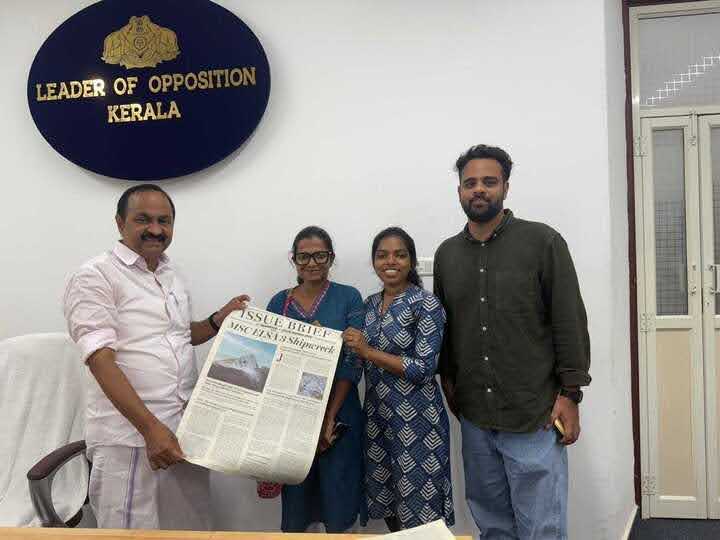
We also met V.D. Satheeshan (Leader of Opposition). He requested further materials on international cases and ecological harm, said he will raise the issue in the Assembly, and signed a postcard to MSC.
Media Impact
On World Oceans Day (June 8, 2025), actions across Odisha, Kerala, and Chennai generated rare multi-state coverage. Hero images from Konark were picked up by the Associated Press, The Hindu, and leading Odia dailies, while 15+ Malayalam outlets highlighted our solidarity action after the Kerala shipwreck. Chennai’s clean-up secured more than 25 regional hits, expanding reach in both English and Tamil media.
The White Paper and Press Conference drew 23 national and regional stories, with The Hindu, Times of India, and New Indian Express putting Greenpeace India in headlines. Regional platforms like Onmanorama, Madhyamam, and Deepika echoed our demands for cleanup and compensation.
Both moments marked a clear shift: Greenpeace India was not just covered, but centered in storytelling, strengthening credibility and public trust on oceans and corporate accountability.
Bearing Witness, Building Solidarity
From Sri Lankan nurdle mapping to Mumbai street theatre, more than 25 groups — unions, fishworkers, citizens — became part of this fight.
And finally, the tide shifted.
The Kerala Chief Minister recently announced an environmental impact study. Soon after, the High Court ordered MSC to pay ₹1,200 crore towards environmental damage and community financial losses.
This is more than disaster response.
It is a collective act of bearing witness.
It is the beginning of regional solidarity against corporate polluters.
The fight is far from over. But every oil-stained net, every postcard, every street stencil, and every act of bearing witness has brought us closer to one truth: justice for the ocean, and justice for the people who live by it.

